高中英语语法省略句
高中英语语法-省略句。吉林油田高中朱雪燕
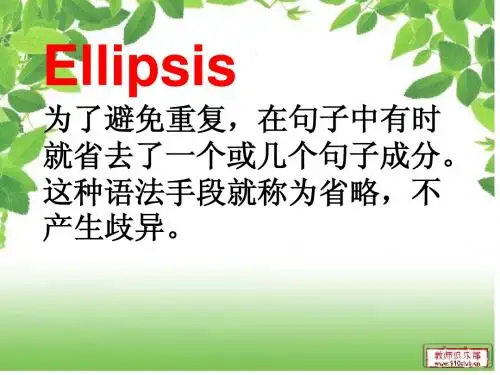
• 5.动词不定式的省略 • 1)She asked me to dance with her, but I didn’t want to (dance with her). • --Will you go with me? • --Well, I’d like to (go with you). • 总结:1. 为避免重复,常省略上文已提到的
• 助动词的省略。 • (Does) Anyone want a drink? • I suggest that we (should )have a class meeting to discuss the plan.
• 2. 在祈使句中 • (You) Open the door, please. (You’d) Better take an unbrella. • 3. 在感叹句中 • What a good boy (he is)! • What a fine day (it is)!
• What surprised me was not what he said but ________ he said it. (NMET 2004湖北卷) • A. the way B. in the way that • C. in the way D. the way which
(三)宾语从句中的省略 • 1.We all know (that) light travels faster than sound. • I hope (that) you’ll be fine soon. • 1.引导宾语从句的连词that常被省 略,但多个宾语从句并列时,通常 只省略第一个that
• The man we followed suddenly stoped as if to see whether he was going in the right direction. • He acts as if (he were) a foo (she was)angry.
高中英语省略句
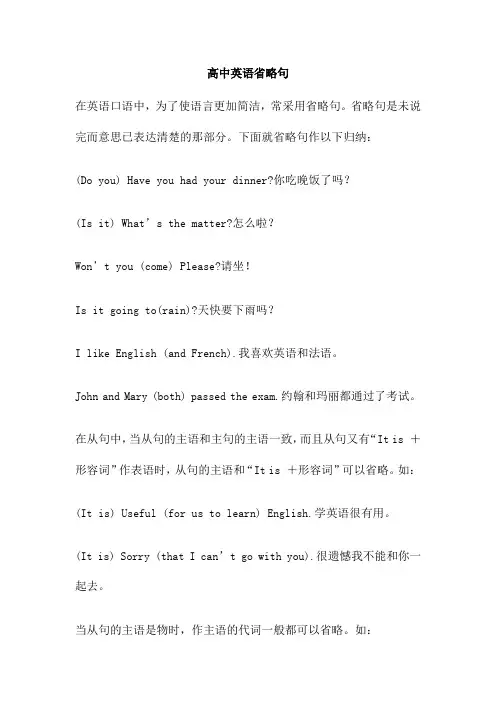
高中英语省略句在英语口语中,为了使语言更加简洁,常采用省略句。
省略句是未说完而意思已表达清楚的那部分。
下面就省略句作以下归纳:(Do you) Have you had your dinner?你吃晚饭了吗?(Is it) What’s the matter?怎么啦?Won’t you (come) Please?请坐!Is it going to(rain)?天快要下雨吗?I like English (and French).我喜欢英语和法语。
John and Mary (both) passed the exam.约翰和玛丽都通过了考试。
在从句中,当从句的主语和主句的主语一致,而且从句又有“It is +形容词”作表语时,从句的主语和“It is +形容词”可以省略。
如:(It is) Useful (for us to learn) English.学英语很有用。
(It is) Sorry (that I can’t go with you).很遗憾我不能和你一起去。
当从句的主语是物时,作主语的代词一般都可以省略。
如:The book (that I read yesterday) is very interesting.我昨天读的那本书很有趣。
在定语从句中,当先行词在定语从句中作状语时,关系代词可以省略。
如:The way (that/which) we use is more convenient.我们使用的方法更简便。
The reason (why) he was late is that he had to help the old lady across the street.他迟到的原因是他得帮助那位老太太过马路。
在一些表示建议、请求、命令等含义的动词后的宾语从句中,谓语动词常省略。
如:I suggest (that) we (should) discuss the matter.我建议我们讨论这个问题。
省略句的类型和用法
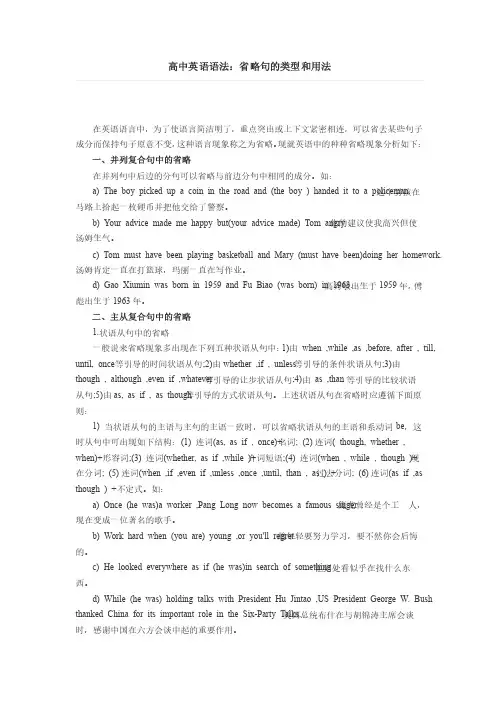
高中英语语法:省略句的类型和用法在英语语言中,为了使语言简洁明了,重点突出或上下文紧密相连,可以省去某些句子成分而保持句子原意不变,这种语言现象称之为省略。
现就英语中的种种省略现象分析如下:一、并列复合句中的省略在并列句中后边的分句可以省略与前边分句中相同的成分。
如:a) The boy picked up a coin in the road and (the boy ) handed it to a policeman. 这个男孩在马路上拾起一枚硬币并把他交给了警察。
b) Your advice made me happy but(your advice made) Tom angry .你的建议使我高兴但使汤姆生气。
c) Tom must have been playing basketball and Mary (must have been)doing her homework. 汤姆肯定一直在打篮球,玛丽一直在写作业。
d) Gao Xiumin was born in 1959 and Fu Biao (was born) in 1963.高秀敏出生于1959年,傅彪出生于1963年。
二、主从复合句中的省略1.状语从句中的省略一般说来省略现象多出现在下列五种状语从句中:1)由when ,while ,as ,before, after , till, until, once等引导的时间状语从句;2)由whether ,if , unless 等引导的条件状语从句;3)由though , although ,even if ,whatever等引导的让步状语从句;4)由as ,than 等引导的比较状语等引导的方式状语从句。
上述状语从句在省略时应遵循下面原从句;5)由as, as if , as though 则:1) 当状语从句的主语与主句的主语一致时,可以省略状语从句的主语和系动词be,这时从句中可出现如下结构:(1) 连词(as, as if , once)+ 名词; (2) 连词( though, whether , when)+形容词;(3) 连词(whether, as if ,while )+介词短语;(4) 连词(when , while , though )+ 现过去分词; (6) 连词(as if ,as 在分词; (5) 连词(when ,if ,even if ,unless ,once ,until, than , as ) + though ) + 不定式。
高中英语知识点归纳省略句的种类与用法
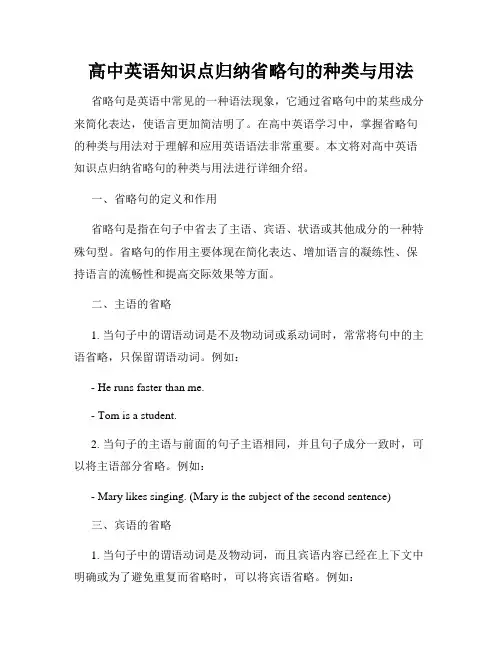
高中英语知识点归纳省略句的种类与用法省略句是英语中常见的一种语法现象,它通过省略句中的某些成分来简化表达,使语言更加简洁明了。
在高中英语学习中,掌握省略句的种类与用法对于理解和应用英语语法非常重要。
本文将对高中英语知识点归纳省略句的种类与用法进行详细介绍。
一、省略句的定义和作用省略句是指在句子中省去了主语、宾语、状语或其他成分的一种特殊句型。
省略句的作用主要体现在简化表达、增加语言的凝练性、保持语言的流畅性和提高交际效果等方面。
二、主语的省略1. 当句子中的谓语动词是不及物动词或系动词时,常常将句中的主语省略,只保留谓语动词。
例如:- He runs faster than me.- Tom is a student.2. 当句子的主语与前面的句子主语相同,并且句子成分一致时,可以将主语部分省略。
例如:- Mary likes singing. (Mary is the subject of the second sentence)三、宾语的省略1. 当句子中的谓语动词是及物动词,而且宾语内容已经在上下文中明确或为了避免重复而省略时,可以将宾语省略。
例如:- Can you speak French? Yes, I can. (French is the object of speak)四、状语的省略1. 当句子中的状语从句与主句的主语或宾语一致时,可以将状语从句中的主语或宾语省略。
例如:- He speaks English better than I (do). (I is the subject of do)- She likes swimming more than her sister (does). (Her sister is the subject of does)2. 当句子中的状语从句与主句的谓语动词一致时,可以将状语从句中的谓语动词省略。
例如:- I work harder than you (do). (Do is the verb of the subordinate clause)五、被动语态的省略1. 当句子中的被动语态中的被动助动词和be动词前面有介词时,可以将be动词和介词省略。
高考英语语法知识点归纳总结:省略句
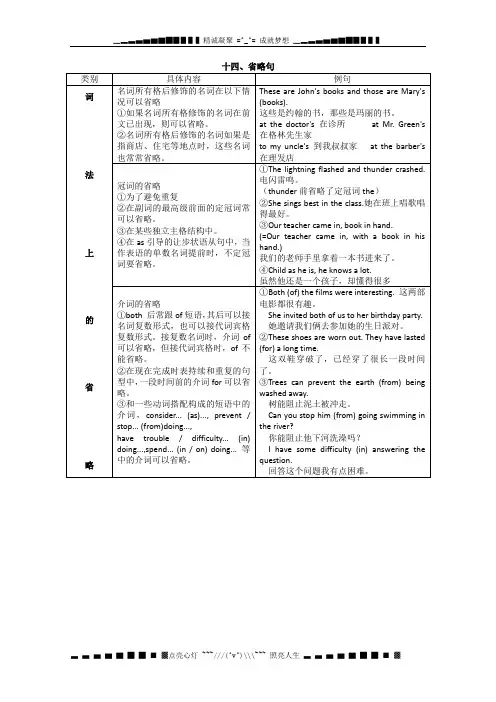
④Child as he is, he knows a lot.
虽然他还是一个孩子,却懂得很多
介词的省略
①both后常跟of短语,其后可以接名词复数形式,也可以接代词宾格复数形式。接复数名词时,介词of可以省略,但接代词宾格时,of不能省略。
②在现在完成时表持续和重复的句型中,一段时间前的介词for可以省略。
这双鞋穿破了,已经穿了很长一段时间了。
③Trees can prevent the earth (from) being washed away.
树能阻止泥土被冲走。
Can you stop him (from) going swimming in the river?
你能阻止他下河洗澡吗?
I have some difficulty (in) answering the question.
约翰一定在踢球,而玛丽一定在做作业。
②His suggestions made John happy, but (his suggestions made) Mary angry.
他的建议使约翰高兴,却使玛丽很生气。
③Old McDonald gave up smoking for a while, but (he) soon returned to his old ways.
有些动词,tell, ask, allow, expect, force, invite, permit, persuade, order, warn, wish, would like,forbid等后跟动词不定式作宾语补足语、主语补足语时,不定式承前省略动词原形,保留动词不定式符号to。
He didn't come, though we had invited him to (come).
【高中英语】英语语法顺口溜:省略句口诀
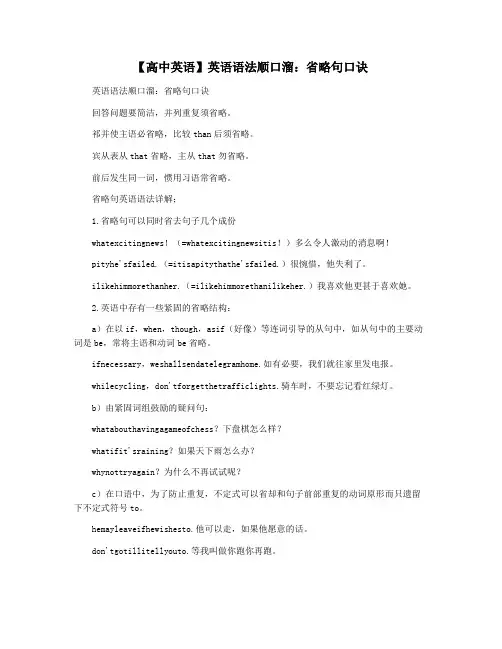
【高中英语】英语语法顺口溜:省略句口诀英语语法顺口溜:省略句口诀回答问题要简洁,并列重复须省略。
祁并使主语必省略,比较than后须省略。
宾从表从that省略,主从that勿省略。
前后发生同一词,惯用习语常省略。
省略句英语语法详解;1.省略句可以同时省去句子几个成份whatexcitingnews!(=whatexcitingnewsitis!)多么令人激动的消息啊!pityhe'sfailed.(=itisapitythathe'sfailed.)很惋惜,他失利了。
ilikehimmorethanher.(=ilikehimmorethanilikeher.)我喜欢他更甚于喜欢她。
2.英语中存有一些紧固的省略结构:a)在以if,when,though,asif(好像)等连词引导的从句中,如从句中的主要动词是be,常将主语和动词be省略。
ifnecessary,weshallsendatelegramhome.如有必要,我们就往家里发电报。
whilecycling,don'tforgetthetrafficlights.骑车时,不要忘记看红绿灯。
b)由紧固词组鼓励的疑问句:whatabouthavingagameofchess?下盘棋怎么样?whatifit'sraining?如果天下雨怎么办?whynottryagain?为什么不再试试呢?c)在口语中,为了防止重复,不定式可以省却和句子前部重复的动词原形而只遗留下不定式符号to。
hemayleaveifhewishesto.他可以走,如果他愿意的话。
don'tgotillitellyouto.等我叫做你跑你再跑。
3.被省略的部分一般可以在句子中补上,但有时省略结构已经定型,如果把省略部分补上,反而不合乎习惯。
heistallerthaniam.他比我低。
(am之后省略tall,迁调上相左习惯)noparking.禁止停车。
(完整版)高中英语语法省略句
省略句为了使话说得简明扼要,英语句子中某个单词、短语甚至从句或主句都可以省去。
这种省去句子某些成分而保持句子意思不变的现象,称为省略(ellipsis)Ⅰ、状语从句中的省略用法一、如果从句的主语和主句的主语一致,且从句的谓语含有be动词的某种形式(am/is/are/was/were),可同时省略从句的主语和be动词的某种形式。
1、when,while引导的时间状语从句e.g. Do be careful when (you are) crossing the street.When/While (I was) on my way to work, I met her.2、if,unless,once引导的条件状语从句e.g. If (it is) properly treated, waste will do no harm to the environment.I’ll not go to the party unless (I am) invited.Once (you are) caught stealing in a supermarket, you will be punished.3、though,although,whether,no matter whether/what/how/who等引导的让步状语从句e.g. He was happy, though/although (he was) poor.Whether (she is) sick or well, she is always cheerful.No matter how/However hard the task (is), we must fulfill it in time.(注:从句的主语和主句的主语不一致时,只省略从句中的be动词形式)4、as if,as though引导的方式状语从句e.g. He rubbed his eyes and yawned as if/though (he was) waking up after along sleep.He stood up as if/though (he wanted) to leave.(as if/though + to do表示一个将来的动作)二、than,as引导的比较状语从句中的省略用法:当不同的主语进行比较时,一般省略从句中的谓语;当从句中的主语与谓语(be动词除外)和主句中的主语与谓语相同时,通常省略从句中的主语和谓语,只保留比较部分。
高考英语省略句解析
高考英语省略句解析省略是英语语法中的一个重要现象,尤其在高考英语中经常会出现省略句。
省略句的出现不仅能够简化句子结构,使语言更加简练流畅,还有助于提高语言的表达效果。
本文将详细解析高考英语中常见的省略句,帮助考生更好地理解和应对这一题型。
1. 省略主语省略主语是英语中最常见的省略形式之一。
当主语在上文中已经明确指代或暗示时,可以在下文中省略主语,使句子结构简洁明了。
例如:原句:Tom is good at playing basketball. He often wins the game.省略主语:Tom is good at playing basketball. Often wins the game.2. 省略谓语谓语的省略在高考英语中也较为常见。
当句子的主语为it, this, that, these, those等指示代词时,常常可以省略谓语动词,简化句子结构。
例如:原句:He knows a lot about computers, but I don't know.省略谓语:He knows a lot about computers, but I don't.3. 省略宾语宾语的省略是一种语言表达的简化方式。
当句子中的宾语是人称代词时,常常可以省略宾语,使句子更加简洁。
例如:原句:I saw him yesterday, but he didn't see me.省略宾语:I saw him yesterday, but he didn't see.4. 省略定语从句定语从句的省略在高考英语中也颇为常见。
当定语从句的主语和谓语与主句中的一致时,可以将定语从句中的主语和谓语省略,只保留从句中的关系词和其他修饰成分。
例如:原句:The book that I borrowed from the library yesterday is very interesting.省略定语从句:The book I borrowed from the library yesterday is very interesting.5. 省略介词短语在高考英语中,介词短语的省略也是一种常见现象。
高中英语语法——省略句(26张PPT)
please.
的一部分)
A: Would you like to
come to the party? B: I’d love to (come the
party).
不定式后 省略动词
They do not visit their parents
as much as they ought to (visit
பைடு நூலகம்
— Well, her parents wouldn’t allow
her to go to the party, but she
still _____.
A. hopes to
B. hopes so
C. hopes not
D. hopes for
(江苏2017)
4. — Have you got any particular
You can borrow my first aid notes if you want to (borrow my first aid notes).
不定式后省略动词
7) Sounds like a good idea. (It) sounds like a good idea.
8) Anything I can do for you? (Is there) anything I can do for you?
5. Sorry to hear that. I’m sorry to hear that.
6. Pity you couldn’t come.
It’s/ What a pity you couldn’t come. 7. This way, please.
Step this way, please.
高中英语语法专题复习省略句
His suggestion is that we (should) set out right away.
The order that we (should) stay where we are is very serious and severe.
省略相同的谓语动词
三 复合句中的省略
1、主句中有一些成分被省略,如:
( I’m Sorry to hear you are ill. ()It’s a ) Pity that he missed such a good chance.
主句中有一些成分被省略、而用so或not来代替
-Are you leaving for Beijing this Sunday -I think so. I’m leaving for Beijing this Sunday.
–Are you an engineer – No, but I want to . be –He hasn’t finished the task yet.
–Well, he ought to .have
Attention !
使役动词及感官动词后面作宾语补足语的不定 式一定要省去to,但在被动语态中须将to复原。
If I had a lot of money, I’d aid the poor children.
Had I a lot of money, I’d aid the poor children. Should there be bird-flu, what would we do
在含有表示“命令、要求、建议、许可”或“禁止” 等意义的名词性从句中使用“should + 动词原形” 表示虚拟语气的,should常可以省略。如:
- 1、下载文档前请自行甄别文档内容的完整性,平台不提供额外的编辑、内容补充、找答案等附加服务。
- 2、"仅部分预览"的文档,不可在线预览部分如存在完整性等问题,可反馈申请退款(可完整预览的文档不适用该条件!)。
- 3、如文档侵犯您的权益,请联系客服反馈,我们会尽快为您处理(人工客服工作时间:9:00-18:30)。
省略句为了使话说得简明扼要,英语句子中某个单词、短语甚至从句或主句都可以省去。
这种省去句子某些成分而保持句子意思不变的现象,称为省略(ellipsis)Ⅰ、状语从句中的省略用法一、如果从句的主语和主句的主语一致,且从句的谓语含有be动词的某种形式(am/is/are/was/were),可同时省略从句的主语和be动词的某种形式。
1、when,while引导的时间状语从句e.g. Do be careful when (you are) crossing the street.When/While (I was) on my way to work, I met her.2、if,unless,once引导的条件状语从句e.g. If (it is) properly treated, waste will do no harm to the environment.I’ll not go to the party unless (I am) invited.Once (you are) caught stealing in a supermarket, you will be punished.3、though,although,whether,no matter whether/what/how/who等引导的让步状语从句e.g. He was happy, though/although (he was) poor.Whether (she is) sick or well, she is always cheerful.No matter how/However hard the task (is), we must fulfill it in time.(注:从句的主语和主句的主语不一致时,只省略从句中的be动词形式)4、as if,as though引导的方式状语从句e.g. He rubbed his eyes and yawned as if/though (he was) waking up after along sleep.He stood up as if/though (he wanted) to leave.(as if/though + to do表示一个将来的动作)二、than,as引导的比较状语从句中的省略用法:当不同的主语进行比较时,一般省略从句中的谓语;当从句中的主语与谓语(be动词除外)和主句中的主语与谓语相同时,通常省略从句中的主语和谓语,只保留比较部分。
e.g. He is taller than his brother (is).I have as much as confidence in you as (I have confidence) in him.三、以if从句为代表的状语从句中的特殊省略用法:通常省略了it is,that is,there is/are。
e.g. If (it is) possible/necessary, this old temple will be rebuilt.If (that is) so, I will call you back at 5:00 pm.There are only a few books in our school library, if (there are) any.Ⅱ、定语从句中的省略用法关系词的省略关系代词that,which,whom等在限制性定语从句中充当宾语且不位于介词之后时,可以省略;in which或that在先行词way后作方式状语从句时可省略。
e.g. The man (that/who/whom) you visited last night is my grandpa.I don’t like the way (in which/that) you treat the girl.Ⅲ、虚拟语气中if及should的省略1、当条件状语从句中有were,had,should等时省略if,把它们提至句首,形成倒装句。
e.g. If I were a teacher, I would be strict with my students.= Were I a teacher, I would be strict with my students.2、Suggest,insist,order,require等表示建议、要求、命令的动词后接的从句中,谓语动词常用“should+动词原形”,should可以省略。
e.g. The doctor suggested that he (should) try to lose weight.Ⅳ、不定式符号to的省略1、感官动词see,hear,feel,watch等和使役动词have,make,let等后接不定式作宾语时,不定式省略to。
(一感feel,二听hear, listen to, 三让have, let, make,四看see, look at, observe, watch)2、do nothing but,can’t help but等结构常接省略to的不定式。
E.g. We didn’t do anything but stay at home watching TV yesterday.Hearing th e news, she couldn’t help but cry.3、在特定语境中为了避免重复,当不定式再次出现时,在want,wish,hope,try,plan,like,love,hate后往往只保留to,而省略后面的动词。
但不定式后有be,have时,也保留be和have。
E.g. My parents encouraged me to go to college, but I didn’t want to.Ⅴ、So和not的替代性省略用于避免重复前面所说过的内容,替代词so/not替代肯定或否定的名词性从句。
可与believe,do,expect,fear,guess,hope,say,speak,suppose,think,I’m afraid等连用e.g. – Do you suppose he is going to attend the meeting? – I suppose not.Ⅵ、日常交际中的省略在情景会话中,答语常常省略不会引起歧义的主语、谓语或宾语部分,而只保留对方希望了解的内容。
在复合句或并列句中,也有省略主、谓、宾的情况。
e.g. – How many copies do you want? -- (I want) Three copies, please.-- Have you ever been to the Great Wall? -- No, (I have) never (been to the Great Wall).随讲随练1、—Lucy,could you please spare me a few minutes?—____,but I hope "a few minutes" won't turn into a few hours.A. It doesn't matterB. That's kind of youC. I'm afraid notD. I guess so2、—Hey,taxi!—_____—I want to go to the dentist's.A. Good morning, sir.B. Nice to see you, sir.C. Where to, sir?D. What are you going to do, sir?3、The doctor expresses his strong desire that the patient _____ immediately.A. be operated onB. operated onC. was operated onD. would be operated on4、When he came back, he found the bag he had ____ over the seat was gone.A. left to hangB. left hangingC. left hungD. to leave hanging5、Liu Xiang spoke slowly to the Special Olympic competitors so as to have them____.A. understand himB. to be understoodC. be understoodD. to understand him6、—Are there any English story books for us students in the library?—There are only a few, ____.A. if anyB. if haveC. if someD. if has8、—Does Betty know where her violin is?—She saw somebody walking off with one, but she doesn't know____.A. whoseB. itC. whomD. which9、—Aren't you the manager?—No, and I ____.A. don't wantB. don't want toC. don't want to beD. don't10、—How are you getting on with your work?—Oh, I'm sorry. Things aren't going so well as____.A. plansB. planningC. plannedD. to plan11、—What's the matter with you?—I didn't pass the test, but I still____.A. hope soB. hope toC. hope itD. hope that12、The doctor did what he could ___ the boy, but in vain.A. saveB. to saveC. savingD. saved13、—You look happy today, Mary.—I like my new dress and Mother ___, too.A. likesB. doesC. isD. do14、—What happened to the boy? He was making so much noise.—He wanted to play football, but his mother warned him ____.A. notB. toC. not toD./15、____ for your brother, I would not have gone to see Mr. Wang.A. If it is notB. Were it notC. Had it not beenD. If they were not省略句练习1. When first ________ to the market, these products enjoyed great success. (NMET 2004全国卷II)A. introducingB. introducedC. introduceD. being introduced2. It shames me to say it, but I told a lie when ________ at the meeting by my boss. (NMET 2004全国卷IV)A. questioningB. having questionedC. questionedD. to be questioned3. The man we followed suddenly stopped and looked as if ________ whether he was going in the right direction. (NMET 2003 安徽春)A. seeingB. having seenC. to have seenD. to see4. Generally speaking, ________ according to the directions, the drug has no side effect. (NMET2003上海卷)A. when takingB. when takenC. when to takeD. when to be taken5. Unless ________ to speak, you should remain silent at the conference. (NMET 2003上海春)A. invitedB. invitingC. being invitedD. having invited6. When ________ , the museum will be open to the public next year. (NMET 2002上海春)A. completedB. completingC. being completedD. to be completed7. Though ________ money, his parents man-aged to send him to university. (NMET 2002上海卷)A. lackedB. lacking ofC. lackingD. lacked in8. The research is so designed that once ________ nothing can be done to change it. (NMET 2002)A. beginsB. having begunC. beginningD. begun9. —You 're always working. Come on, let's go shopping.— ________ you ever want to do is going shopping. (NMET 2002北京、安徽、内蒙古春)A. AnythingB. SomethingC. AllD. That10. Is this the reason ________ at the meeting for his carelessness in his work?(NMET 2002上海春)A. he explainedB. what he explainedC. how he explainedD. why he explained11. What surprised me was not what he said but ________ he said it. (NMET 2004湖北卷)A. the wayB. in the way thatC. in the wayD. the way which12. It is easy to do the repair. ________ you need is a hammer and some nails. (NMET 2004天津卷)A. SomethingB. AllC. BothD. Everything13. That's an unpleasant thing to say about your father after ________ he's done for you. (NMET 2004全国卷)A. somethingB. anythingC. allD. that14. As you've never been there before, I'll have someone ________ you the way. (MET 1990上海卷)A. to showB. showC. showingD. showed15. —I'll be away on a business trip. Would you mind looking after my cat?—Not at all, ________ . (NMET 1995)A. I have no timeB. I'd rather notC. I'd like itD. I'd be happy to16. —Does your brother intend to study German?—Yes, he intends ________ . (NMET 1998上海卷)A. /B. toC. soD. that17. —Would you like to go to the Grand Theatre with me tonight?— ________ . (NMET 1999上海卷)A. Yes, I'd like to go to the Grand TheatreB. I'd like to, but I have an exam tomorrowC. No, I won'tD. That's right18. —You should have thanked her before you left.—I meant ________ , but when I was leaving I couldn't find her anywhere. (NMET 2000北京春招卷)A. to doB. toC. doingD. doing to19. ________ it rain tomorrow, we would have to put off the visit to the Yangpu Bridge. (NMET 1994上海卷)A. WereB. ShouldC. WouldD. Will20. ________ for the free tickets, I would not have gone to the films so often. (NMET 1995上海卷)A. If it is notB. WereC. Had it not beenD. If they were not21. I will know what was on his mind at the time, nor will ________ . (NMET 2004 江苏卷)A. anyoneB. anyone elseC. no oneD. no one else22. Of the making of good books there is no end; neither ________ any end to their influence on man's lives. (NMET 2004 广东卷)A. there isB. there areC. is thereD. are there23. —I would never come to this restaurant again. The food is terrible!— ________ . (NMET 2004全国卷III)A. Nor am IB. Neither would IC. Same with meD. So do IKeys:1—5 BCDBA 6—10 AADCA 11—15 AACBD 16—20 BBBBC 21—23 BCB CLA初高中英语交流群533303274 版权所有。
